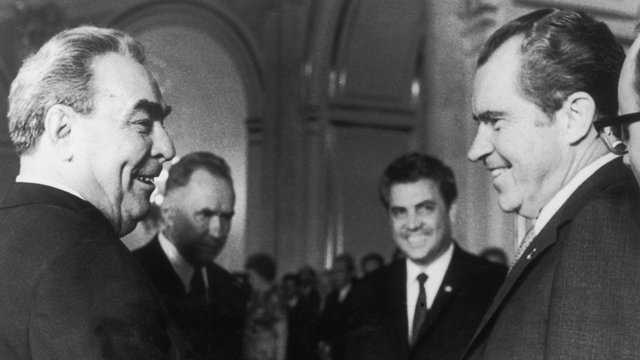When was the last time you licensed out your song or book? Or sold your trademarked design or patented invention? Or performed lighting fixtures or air conditioning installation work?
Or how about the last time you received interest payments for financing cross-border trade? Or earned income from operating or selling airplanes or ships internationally? Or received reinsurance premiums?

Archival photo of Soviet leader Leonid Brezhnev and U.S. President Richard Nixon (Photo: The Guardian)
Ok, now… when was the last time you transacted on any of the above with someone living outside of the United States? Say, someone from the post-Soviet area… Armenia, anyone?
Running the risk of drastically decimating the readership of this op-ed with each additional question, I should better stop here.
You see, the highly singular items of income listed above make up a very large part of a 1973 accord between the U.S. and U.S.S.R. governments on waiving their own taxes for residents of the other country, in an effort to avoid double taxation. A noble cause, indeed. However, this antiquated tax treaty has since outlived its Soviet co-author and has instead found a foster home in U.S.-Armenia relations, with the U.S. insisting on its validity and Armenia renouncing it.
Until recently, when asked about replacing the 1973 double tax treaty with a new one between U.S. and Armenia, the position of the U.S. government has been brutally straightforward: negotiating a new tax treaty is a “very resource-intensive process” that is not warranted by the limited bilateral trade between the U.S. and Armenia or the lack of interest from the private sector… and besides, the 1973 U.S.-U.S.S.R. double tax treaty does the job.
But does it?
This “legacy” double tax treaty was adopted when the Cold War was at its coolest and Containment policy was being deployed without containment. Double tax treaties otherwise tend to regulate critical aspects of bilateral trade between two countries and thus have profound economic significance… except that this one was signed between two countries with limited bilateral trade and fundamentally divergent economic systems.
So, one cannot help but wonder whether this Nixon-Brezhnev pact was anything but a grand exercise in theatrics of highly ceremonial importance.
To be fair, the 1973 treaty did have some tooth to it. For example, the income of teachers, researchers, students, trainees, specialists, intergovernmental cooperation program participants, and governmental employees who were residents of one country but were temporarily physically present in the other country for educational, research, professional, or similar purposes was tax-exempt in that other country. The personal services income earned by a resident of one country while temporarily physically present and working in the other country was also free from tax in that other country. Finally, it had respectable, albeit minimal, clauses on non-discrimination, mutual agreement procedure, and exchange of information.
But, essentially, this is where it ended.
This may have been ambitious at the time given the atmosphere of distrust and the state of technology—but in today’s age of globalization, advanced telecommunications, and free flow of resources and capital, this treaty is plain anachronistic. Focusing on yesterday’s income items and lacking any substantial reference to more popular income types such as business profits, dividends, and capital gains only compounds the obsolescence of this international contract.
Unfortunately, the problem goes further than that. Showcasing a treaty that is on “life support” as a modern solution to bilateral trade is not only a disservice to the level of cooperation that the U.S. and Armenia have achieved over the past nearly thirty years. It also sends the painful, if unintended message that those relations are premised on a treaty adopted between two antagonistic powers.
Whichever way you look at it, the U.S.-U.S.S.R. double tax treaty just does not fit U.S.-Armenia relations as they stand today.
This is why the recent remarks by Treasury Secretary Mnuchin come as a healthy break from a decades-long stream of pushbacks. Responding to Rep. Brad Sherman (D-Calif.) during congressional testimony, Secretary Mnuchin publicly committed 28 hours of negotiations to work on a new tax treaty with the Armenian government–reflecting the number of Congressional signatures collected at the time for a letter addressed to the Secretary by Congressmen Sherman and David Valadao (R-Calif.) in support of the treaty. That number has since grown to 31 Members of Congress, who represent over 22,000,000 Americans.
The Armenian government is also onboard, and has been so for decades since the founding of the republic. Most recently, the Armenian Embassy in Washington, D.C. affirmed that Armenia is willing to conclude a tax accord on the basis of the U.S. Model Income Tax Convention. Just last month, the importance of deepening economic ties and expanding the agenda of cooperation between the U.S. and the Republic of Armenia was highlighted at the meeting between Armenian Prime Minister Karen Karapetyan and U.S. Deputy Assistant Secretary of State Bridget Brink.
The private sector is also in. The U.S. position that there is lack of interest from the private sector is being silenced by the bustle of tech companies, knowledge-based start-ups, and capital-intensive enterprises like energy and hospitality that acknowledge the benefits of doing business cross-border: whether it’s access to capital and consumer markets in the U.S., or access to talent and regional markets in Armenia. Paul Korian and Peklar Pilavjian, leading U.S. investors in Yerevan’s landmark Marriott hotel; internationally renowned Tufenkian Artisan Carpets; Apple Design Award-winning Triada Studio; and creator of the super-popular photo-editing app PicsArt are among the many advocates urging the lifting of tax barriers to U.S.-Armenia trade.
International tax law experts are also welcoming the long-overdue developments. “The 1973 U.S.-U.S.S.R. tax convention is long antiquated. An income tax convention between Armenia and the United States is necessary to improve commerce between the two countries and to allow American companies operating in Armenia to do so with the protection that a modern treaty would provide,” commented Rufus Rhoades, Esq., author of the authoritative legal text on U.S. international taxation and tax treaties spanning six volumes. “Russia has a modern treaty with the United States; Kazakhstan has a modern treaty with the United States; Ukraine has a modern treaty with the United States. It is time for Armenia to have a modern tax treaty with the United States.”
With the U.S.-Armenia TIFA Council set to meet in a few days, this build-up of momentum comes at just the right time. As Armenian National Committee of America National Board Member Aida Dimejian recently remarked, “The ANCA is eager to see concrete progress on a Double Tax Treaty coming out of the much-awaited meeting this March 19th in Washington, DC of the U.S.-Armenia Trade and Investment Framework Agreement Council.”
At the end of the day, as emphasized time and time again by the ANCA through over ten years of diligent advocacy on the topic, having a new tax treaty in place is not a benefit or a privilege or a favor to be extended by one country to another. It is a commonplace exercise in establishing house rules on working together for mutual benefit and for the benefit of their residents and businesses.
And with the Armenian government ready to use the very language adopted by the U.S. government as the basis for treaty negotiations, that exercise goes from being a “resource-intensive process” to a “fill in the blanks” assignment, doable in under 28 hours.
So that the next time you want to sell or rent out your apartment on Komitas to a young couple, or expand your R&D operations to the free economic zone at the Mergelyan Institute, or invest in a promising high tech start-up out of TUMO, or import wine from the lush valleys of Ararat, or buy bonds issued by the Armenian Government, you can rely on a modern, living tax treaty that actually fits.
The post The U.S.-U.S.S.R. Double Tax Treaty Does Not Fit U.S.-Armenia Relations appeared first on The Armenian Weekly.
Source: Armenian Weekly
Link: The U.S.-U.S.S.R. Double Tax Treaty Does Not Fit U.S.-Armenia Relations

